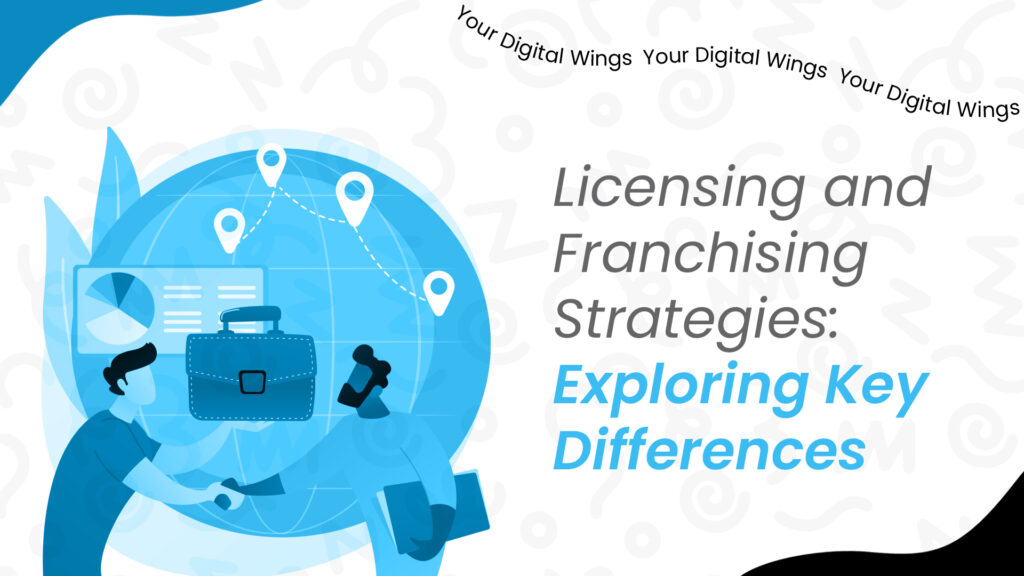Businesses use various strategies to grow their influence, reputation, and revenue in the global markets. Licensing and franchising strategies are two vital approaches to expand your business in the international market. Both these approaches can help businesses position themselves appropriately in foreign markets where the competition is tight. When we discuss the Top International Market Entry Strategies, both licensing and franchising are up there among the top strategies. Licensing and franchising strategies are similar in regard to granting rights to a third party, however, there are several differences between the two.
Understanding Licensing
Licensing is essentially a business arrangement between a company and a third party. The company or licensor grants permission to another party, also known as the licensee, to use the intellectual property. Intellectual property includes stuff like copyrights, trademarks, patents, or proprietary technologies. The company retains the total ownership of the intellectual property and only allows the third party to use it while remaining within the terms outlined in the licensing agreement. The international brand licensing market is projected to grow from USD 274.9 billion in 2022 to USD 385.4 billion by 2027.
The licensing market is expanding rapidly as major industries like software, manufacturing, and entertainment use this approach to generate revenue. These industries leverage their intellectual assets to capitalize on this growing trend.
Key Differences Between Licensing and Franchising
Licensing and franchising strategies are commonly used by businesses all over the globe. But both these aspects can’t be used interchangeably since they are intrinsically different from each other. Let’s go through some of the key differences between licensing and franchising:
| Licensing | Franchising |
| License means granting the rights to use the intellectual property only. | Franchising grants the right to use an entire brand model, including products/services. |
| There is limited control over operations. | Extensive control and support are offered. |
| Minimal business involvement. | Highly involved in business operations. |
| Fees or royalties for IP use. | Upfront franchise fee & continuous royalties. |
| Require low financial investment. | Require higher financial investment. |
| Short-time contracts. | Long-time contractual agreements. |
| Reduced training and support offered. | Extensive training and ongoing support. |
| Adaptability in product customization. | Consistency in operations. |
| Licensing agreements are more common. | Franchise agreements are more prevalent. |
| Examples: Trademarks, software. | Examples: Retail stores and restaurants. |
Pros and Cons of Licensing
Only understanding the key differences between licensing and franchising is not enough. When adopting licensing and franchising strategies, it is also important to consider the benefits and drawbacks of both. Whatever method you use in your Exporting Strategies, just make sure you select the one that suits your business or product type.
Advantages
- Licensing enables businesses to connect with new demographics and customer segments by expanding their market presence through licenses.
- Rather than worrying about production, distribution, and marketing efforts, companies can focus on core issues while the licensees handle the other stuff.
- Licensing offers the opportunity for businesses to monetize their intellectual property without depending upon resources or investments.
- Licensing generates a continuous revenue stream by collecting royalties or licensing fees.
- Licensing helps businesses in international expansion by building partnerships with local licensees who have a solid grip on the market.
- Licensing agreements can lead to collaborations or strategic partnerships. This allows the businesses to reap the benefits such as innovation and growth.
- It allows licensees to use established brand names or technologies, offering them a competitive edge.
- Licensing agreements permit customization of products or services to suit local market needs.
- Licensing can boost brand recognition and expand brands through licensed merchandise or collaborations.
- It helps licensors earn revenue from underused or inactive intellectual property assets.
Disadvantages
- Licensees might become competitors by acquiring substantial knowledge or expertise in the licensed technology or intellectual property.
- Licensing lessens the licensor’s stronghold over the quality and consistency of the products or services provided by the licensee.
- So often it happens that licensees may underutilize the licensed intellectual property, leading to missed revenue opportunities for the licensor.
- Licensing agreements need diligent monitoring and enforcement to avoid unauthorized use or infringement.
- Licensees might lack the motivation or resources to effectively market and promote the licensed products or services.
- Licensing can cause potential conflicts or disputes over exclusivity, territorial rights, or sublicensing arrangements.
- The licensor risks losing control over the licensed intellectual property if the licensee does not adhere to the agreement terms.
- Licensing agreements can be intricate and time-consuming to negotiate and manage, requiring legal expertise.
- Licensees may have restricted rights to modify or enhance the licensed technology or intellectual property.
- Licensing may reduce the licensor’s profit margins due to sharing royalties or licensing fees with the licensee.
Pros and Cons of Franchising
Advantages
- A Franchise builds partnerships and garners the Benefits of Joint Ventures that help in entering new markets with knowledge of the consumer’s preferences and local market knowledge.
- Franchising allows for rapid business growth by utilizing the resources and efforts of franchisees.
- It enables franchisors to expand their brand presence and market reach without significant capital investment.
- Franchisees benefit from operating under a well-known and recognized brand name, attracting customers and boosting sales.
- Franchising offers franchisees a proven business model, along with operational support and training from the franchisor.
- Franchisees can take advantage of collective purchasing power and economies of scale through centralized supply chains.
- Franchisors can earn revenue from franchise fees and ongoing royalties, ensuring a steady income stream.
- Franchising provides franchisees with the opportunity to become entrepreneurs with the backing of an experienced franchisor.
- Franchisees can utilize the franchisor’s marketing and advertising efforts to promote their business.
- Franchising encourages a sense of community and collaboration among franchisees, facilitating shared experiences, best practices, and peer support.
Disadvantages
- Franchisors may have reduced control over individual franchise locations, potentially resulting in inconsistent service quality or brand representation.
- Franchisees may incur significant initial costs, including the franchise fee, ongoing royalties, and operational expenses.
- Franchisees must adhere to the franchisor’s established business model and operational guidelines, limiting their flexibility and autonomy.
- Franchisees are often subject to strict contractual obligations, including purchasing supplies or products from approved vendors at set prices.
- Conflicts may arise between franchisees and the franchisor regarding territorial rights, market exclusivity, or changes to the franchise agreement.
- Franchisees rely on the franchisor’s reputation and success, which can be adversely affected by the franchisor’s actions or brand issues.
- Franchising demands ongoing communication and collaboration between the franchisor and franchisee, which can be time-consuming and demanding.
- Franchisees may face strong competition from other franchisees within the same brand.
- Franchisees may have limited opportunities for creativity and innovation, as they must follow standardized processes and offerings.
- Exiting or selling a franchise business can be challenging, as the franchisor typically has the right of first refusal or approval over potential buyers.
Choosing the Right Strategy for Your Business
When deciding between franchising and licensing for your business, consider what your business needs and goals are. If you’re the franchisor or licensor, evaluate whether your brand is strong, widely recognized, and profitable enough to expand through multiple locations or product lines. For service-based companies, franchising might be suitable; for product-based companies, licensing could be more appropriate. Consult a trademark lawyer to protect your brand and a business attorney to navigate the expansion process.
If you’re the franchisee or licensee, assess where your business stands. A license agreement with a well-known brand can accelerate the growth of a successful product-based business. If you’re starting out and prefer the security of an established brand with guidance from experienced mentors, franchising is a safer option.
Conclusion
In short, Licensing grants rights to use intellectual property with minimal control and fees, suited for short-term agreements (e.g., trademarks, software). Franchising, on the other hand, offers comprehensive brand use, extensive support, and high involvement with upfront fees and long-term commitments (e.g., retail stores, and restaurants).
Both licensing and franchising strategies have their respective pros and cons. Therefore businesses need to carefully evaluate and choose the strategy that aligns with their business perfectly.
For expert assistance in developing and implementing successful licensing and franchising strategies, reach out to Cretesol Tech. Our team of experienced professionals is ready to help your business thrive.
FAQs
What are the main differences between licensing and franchising?
Licensing involves granting rights to use intellectual property with minimal control and typically involves fees or royalties. Franchising grants the right to use an entire business model, including products/services, with extensive support and operational control, often requiring upfront fees and ongoing royalties.
How do I know if my business is better suited for licensing or franchising?
Consider your business model and goals.
- Choose licensing if you want to expand with minimal involvement in operations and lower financial investment, suitable for short-term agreements like trademarks or software.
- Opt for franchising if you seek comprehensive brand expansion with high operational control, extensive support, and a willingness to invest more upfront, ideal for long-term commitments like retail stores or restaurants.
What are the legal considerations for licensing and franchising agreements?
Legal considerations include intellectual property protection, clear contractual agreements defining rights and obligations, compliance with local and international laws, mechanisms for dispute resolution, and terms for termination. Consulting with legal experts specializing in intellectual property and business law is crucial to navigating these complexities effectively.

 United Arab Emirates
United Arab Emirates